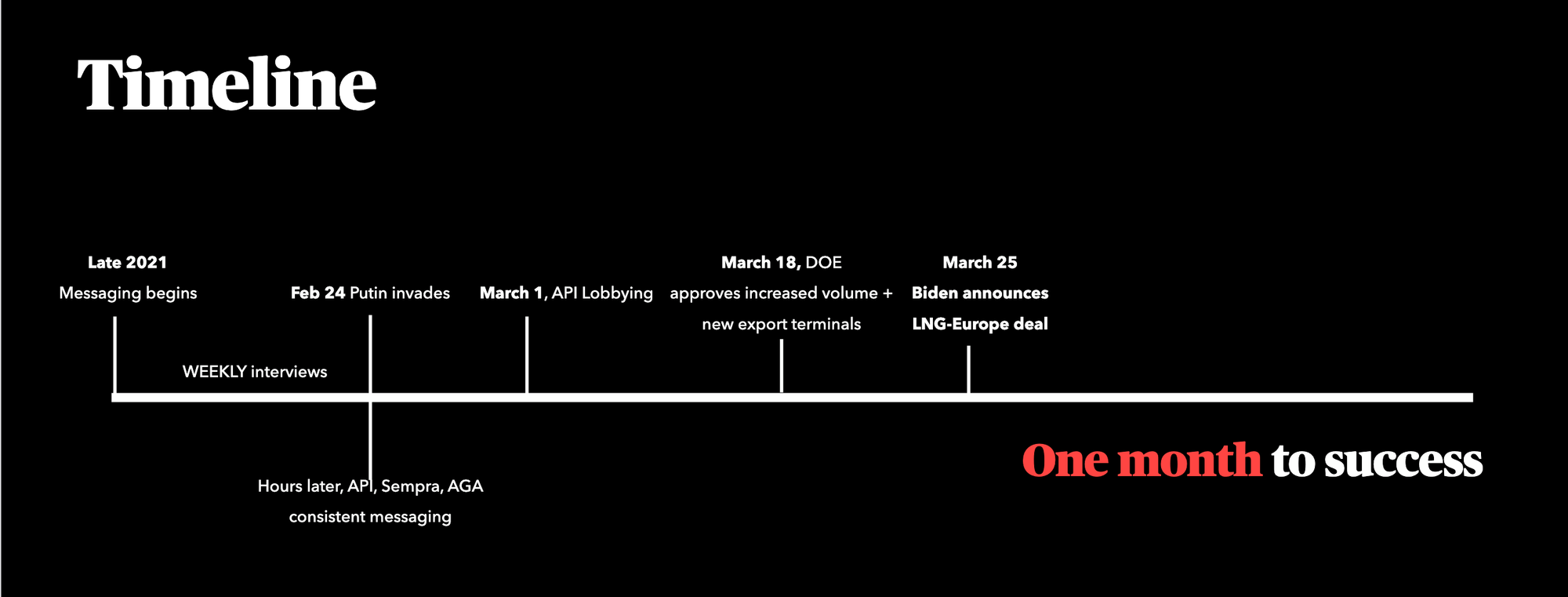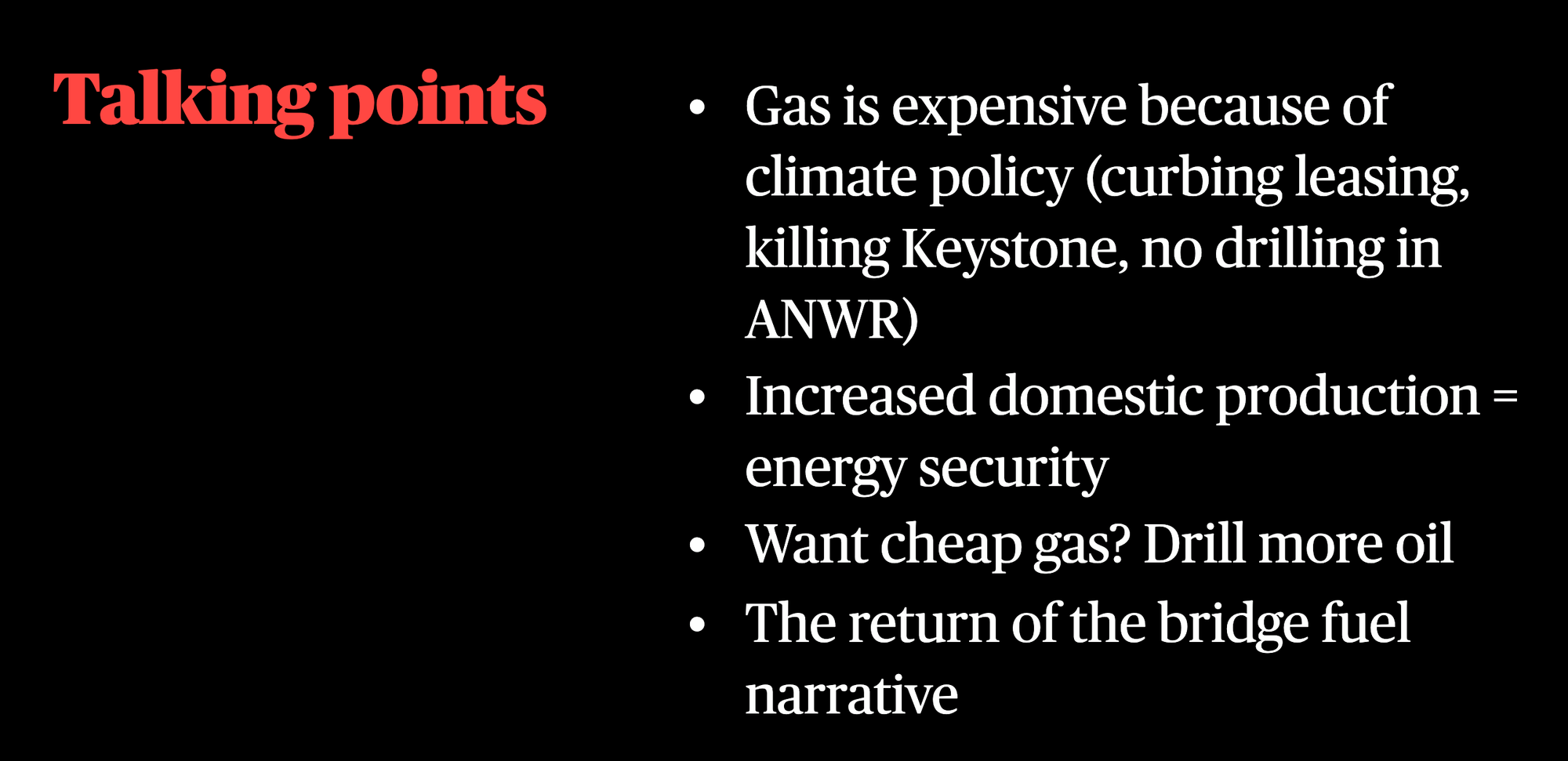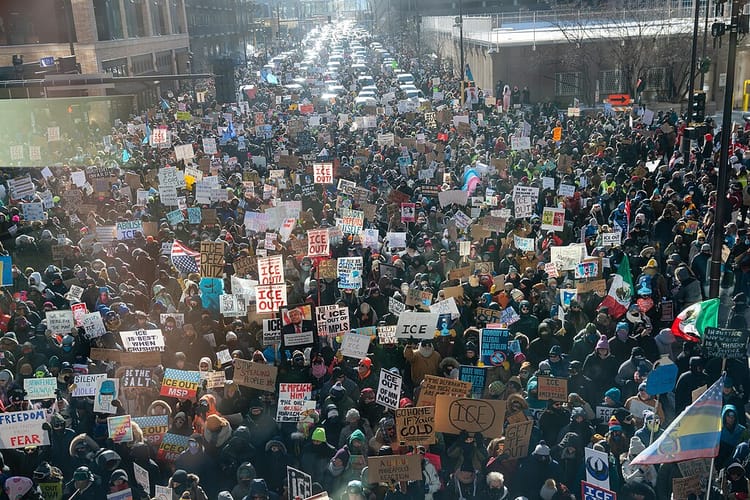The Fossil Fuel Industry Hasn't Come Up With a New Story in 100 Years, Why Do Climate Folks Find It So Hard to Keep Up?

With geopolitics in turmoil, war and genocide raging, the United States running as fast as it can away from climate action, and the disinformation machine supercharged by AI, folks who care about climate action are feeling, understandably, deflated and overwhelmed. I've felt it too! And I've had a lot of conversations lately that boil down to folks struggling with what to say in the face of the fossil fuel industry's rampant expansion and the embrace of it by far-right culture warriors, feeling like the narratives that seemed to be working even just a couple of years ago are not just falling flat now, but seem completely out of step with the current landscape. The most obvious example is around greenwashing, which fossil fuel companies are still doing a little bit of in some countries, but have increasingly abandoned, leaving activists shouting "Stop Greenwahhhh..." as oil companies flip them the bird and roll out campaigns about how awesome oil is and how great they are for producing it.
In some ways that shift is a measure of success. Swatted back by campaigns and litigation at every turn, greenwashing efforts now feel like more of a liability than they're worth for fossil fuel companies. But it's also a marker of the new environment we find ourselves in, one in which global powers are once again lining up behind a vague, baseless U.S. claim about nuclear weapons in the Middle East to justify war, while back home that same government that proclaims itself democracy's warrior overseas has made it all but illegal to whisper the word "climate" for fear of reprisal and created a situation in which researchers and agency staffers literally put their work and proposals through a keyword search to remove any offensive words from them. Freedom! (insert eagle screech here).
I'm going to hold your hand while I say this: There is no reason for climate folks to be unprepared for this moment.
Having studied the narrative stylings of the fossil fuel industry for a good many years now, we here at Drilled have come up with a mind map of the industry's favorite stories. Every talking point they throw out fits into one of these five buckets, and while there are new flourishes here and there and certainly new delivery mechanisms, the five main stories really have not changed for about a century. We've written about these plenty of times, but now we have infographics, behold!


The industry shifts between these narratives, or some combination of them, all the time depending on what is going on. In doing so, it stays ready to both protect itself from regulation and capitalize on opportunities as they arise.
When Putin began saber-rattling with Ukraine, for example, the industry—having learned its lesson with Crimea—deployed a flawless strategy. First, the narrative piece: get out on the cable news shows and tell people that gas prices were going up because of Biden's "climate policy" (he hadn't passed anything resembling a climate policy by that point, but this is classic "Environment vs. the Economy" wordsmithing). Then, as soon as Putin actually invaded, that story morphed into "we're not ready to help our European allies because Biden's environmental policy reduced fossil fuel production." Fossil fuel production had increased more under Biden than any president ever, setting new records in both production and export volumes, but the industry is very good at never letting the truth get in the way of its stories. As it was selling these stories in the press, the industry's top lobby group, the American Petroleum Institute, was pushing its policy wishlist to the government. And within about a month—yes, one month—it worked: Biden had inked a deal with Europe that locked in orders for U.S. LNG producers for at least a decade, agreed to greenlight LNG export terminals and increase export volumes, and generally gave the U.S. gas industry permission to let it rip.


Now, is all of that solely due the industry's narrative prowess? No, of course not! It's also the most profitable industry of all time, with entrenched influence over governments all over the world. Does it help that they have their narratives and corresponding talking points and legislative asks down so that when the moment strikes they're ready? Yeah, of course it does.
It makes perfect sense that the climate movement, outspent and outpowered as it is, might occasionally be caught off guard and need a minute to catch up to the industry's, or the government's, sudden shifts in gear. What makes a lot less sense is why the climate movement still doesn't seem to have its counter-narratives and counter-messaging ready for these shifts; or, if you, like me, are tired of everything always just being a response to what industry is doing, why climate folks haven't figured out their five most effective narratives and how to lean on different stories or combinations of them depending on what is happening in the world. Instead, there's a tendency either to cling to narratives that are no longer working or, conversely, to throw the baby out with the bathwater and start over entirely every time the industry changes its tune. Neither strategy seems very effective.
The industry is able to shift so easily between their top five stories not only because they have worked for decades to embed them, but also because they have made certain to connect their narratives to how people live and how people feel. Rarely do they focus on science or data, logic-based arguments or winning facts, it's all lizard brain, all the time. You're scared of Russia and Saudi Arabia? Don't worry, American oil and gas will keep you safe. War is pretty scary, right? But at least we have stable energy supplies! Shifting gender norms got you down? Fear not, red-blooded American oil and gas will keep you safe. Is inflation making it harder and harder to pay your bills? Well the oil and gas industry would love to heat your home and fill your tank with cheap fossil energy if they could! It's always someone else getting in the way of that while they are just trying to make your life work, and guess what? They make the lives of those pesky environmentalists work too, how would we have phones or healthcare or cosmetics without them? They're just the grubby titan holding up the world and getting no thanks for it. Do you love your kids' Little League team, or New Orleans jazz fest, or your local aquarium, or Formula 1 or the World Cup? Nice of the oil companies to sponsor all of it, eh? You might not love them, but you have to admit they are pretty generous and helpful!
At the moment, the industry is leaning most heavily on its first and favorite story: "we keep you safe." Of course they are, it's a scary time! Partly of their own creation, but they leave that part out. This narrative is often paired with "we make your life work" or "the economy v. the environment." They never really let "we're a great neighbor"—all the arts and culture and sportswashing stuff—go either since it's critical to securing social license. In 2018, though, when Standing Rock had galvanized the climate movement and youth protestors were coalescing around Fridays for Future? Back then the economy and national security were forgotten in favor of "we're part of the solution" and "we're a great neighbor."
The vast majority of climate messaging I see seems to be geared towards that recent past rather than the current moment. We will no doubt see "we're part of the solution" enter the chat during the annual Conference of the Parties, or COP, the UN climate summit, in Brazil later this year, but it's no longer the drum the industry is beating 24-7. So, the big question now then is, what is the climate counter-narrative to "We keep you safe," or what should it be?
It's not actually my job to answer that—I'm a journalist, not a comms strategist or a psychologist. But I can tell you that the people I learn the most from on this front are psychologists like Renee Lertzman who can tell me how people respond to certain types of information, and social scientists like Melissa Aronczyk, Naomi Oreskes, Dana Fisher, Jennifer Jacquet, Timmons Roberts and Robert Brulle, who can tell me what has tended to work in the past, both for obstructionists and for social movements.
And I can tell you about the stories and facts I've seen lately that fly in the face of this claim from industry. For a start, every week I get another press release about how much the insurance and finance industries have underestimated the economic impact of climate change and how much damage that is causing and will continue to cause. Then we all saw the hurricane ravage North Carolina and the fires consume homes in LA, Canada and now Greece. None of that seems very safe. How does it connect to people's lives right now, though, especially to people who are struggling to make ends meet and probably won't pay attention to extreme weather until it shows up at their doorstep? I feel similarly about the climate movement these days as I do about Democrats in the U.S. and Labour in the U.K.: not enough of the folks out there talking to people or crafting the messages that other people use to talk to people have had the experience of being genuinely panicked over how they're going to pay rent next week, or how they're going to use what's in their pantry to feed their family until their next paycheck comes in. That's the reality that the majority of people are dealing with at the moment, and if you haven't ever had that fear, I don't know how you're going to be able to effectively communicate with someone who has. Similarly, too few in the climate movement know the fear of being visibly an immigrant in a country that has suddenly decided that immigrants are their biggest problem, or in a world that feels very comfortable bombing non-white people. The reaction of many in the climate movement, like that of many Democrats, to the U.S. election has been to say "oh we tried to be too inclusive and people didn't like it, so we should stop talking about that." Look, you either believe equity is important or you don't, if it's all about messaging you're going to lose regardless. But also, the problem is not talking about diversity and inclusion, the problem is people not feeling genuinely seen and included. You don't solve that by shifting constantly between the groups who feel excluded and leaping like a magpie to speak first to this group and then to that.
For a very long time, dominant forces in the climate space have waved away concerns about justice and equity, be they race-, class-, or gender-related, as a distraction from the task at hand. In fact, the task of addressing the climate crisis without introducing a new crisis is entirely dependent on us not waving such concerns away. We're currently working on a whole bunch of stories at Drilled HQ and none keep me up at night more than the ones about the shocking amount of time, capital (political and otherwise) and energy being thrown at "solutions" that will never do anything but make a few people very rich. There's only one way to avoid that, folks, and I'm sorry to say it does not solely boil down to convincing everyone to love renewables or hate oil. Would that it were so straightforward!
One of the more compelling climate stories I've heard recently came from Malcolm Harris, author of the book What's Left: Three Paths Through the Planetary Crisis, in which he suggests the formation of "community disaster councils" as a simple, tangible thing that could be done to engender community climate resilience, and community-building in general. It felt to me like the sort of "worldbuilding" I've been hearing people talk about in some pretty abstract ways for a long time, suddenly made real and present.
In an interview he did recently with reporter Adam Lowenstein, which we ran in Drilled, Harris said, "The institutions and individuals with which we compose our communities need to collectively study and prepare for the social and climate disasters that we know are upon us. Wherever you live, you can figure out what extreme weather events are likely to happen, and you can figure out what responses are most likely to keep people safe. We can organize those. We need to do that not only at the level of government disaster response, which we’re seeing undermined by conservatives. But even if that weren’t the case, we need to organize ourselves, not just rely on the state to organize our response to what are society-wide problems, partly because the state is unable to and unwilling to."
He went on to argue that the left is in a particularly good position to lead this kind of effort. I would add that it's something the climate movement could focus on, too: Showing up and helping. It's so easy when you're dealing with a problem this urgent and this hemmed in by the laws of time and physics, to feel that there is simply no time for such things. But there's no time to waste not doing them, either. And it has the added benefit of being a manageable, tangible thing every individual can pitch in on, an easy answer to the question of "what can I, one individual, do in the face of all this?"
"It's something that we all can do, and something we all can do collaboratively," Harris said. "Whether you are a staffer for a state senator who believes in marketcraft or a shop steward who believes that labor should be directing the entire thing or someone who knows the forests around where you live very well."
"We need the resources of all of those kinds of people, as well as the institutions and social networks that they represent," he added. "And we need to find ways for them to cohere, to work together, to respond to these things that we already know are happening. Disasters are organizing us already. Whether we organize in advance of them or in a disorganized way after they have occurred. That’s not crazy, the idea that we should have civil structures that are responding to these big things that we know are coming and that will upend all of our lives. Let’s get ahead of that."
Let's get ahead of that, indeed! In many ways, we're already behind.
This week's recommend climate reads, listens, and watches
- " 'Drilled' goes deep on fossil fuel industry misinformation and the legacy of Standing Rock," by Dan Samorodnitsky for Sequencer. This is a great interview with Alleen about our new season, which you need to be listening to if you're not already. Ep 3 comes out this week, but you can listen to it now if you're a Patreon supporter or paid newsletter subscriber (see below). I am of course very biased, but it's terrific! As is Sequencer, a fantastic new(ish) science publication from established science journalists and alumni of The Daily Beast, Scientific American, WIRED, Quanta, Smithsonian, C&EN, who are also all former scientists. They're offering Drilled readers and listeners a discount: Sign up here (or if you lose this link, sign up in general and use the code DRILLED at checkout) to get your first 3 months at just 50 cents a month.
- Climate Science Translated - the latest from Climate Science Breakthrough pairs comedian David Cross with climate scientist Michael Oppenheimer to translate climate science for the masses. The group was wildly successful taking this approach in the UK, reaching some 10 million viewers on YouTube—a hotbed of climate disinfo—with their unique blend of solid science and popular comedians being their hilarious selves.
- "The Simple Truth About These Miserable Heat Waves," by Kate Aronoff for The New Republic. Sometimes we could all use a reminder that we know exactly what's causing this shit and what to do about it, and there is none better to give that reminder than Kate Aronoff at The New Republic.
- "Mental health and poverty remain a struggle for Maui wildfire survivors, new study says," by Nina Lakhani for The Guardian. An incredible and gut-wrenching look at an aspect of extreme weather we rarely see discussed in the media, the documented link between disasters and increased domestic violence.
- "Dairy Is Milking America Dry," by Climate Town - The great crew over at Climate Town did a hilarious video on how the dairy industry is running Big Oil's playbook, and what that means for all us cheeseheads.
- Drilled has a YouTube channel! Speaking of YouTube, we finally created a channel there. People have been telling us for years that YouTube is the world's primary podcast discovery engine and we finally believe it. But until we can get enough subscribers, we have to create videos out of each episode and upload them manually, and let me tell you it does not feel like a real productive use of time. Eventually we will also be producing video essays on the channel to help turn our mountain of research and reporting material into snackable bits of information that more people can consume. But for now, a simple ask: will you please subscribe? Thank you!
If you'd like to support our reporting, and get access to early and ad-free podcast episodes, plus bonus content, please sign up to support us on Patreon or upgrade to a paid newsletter subscription below. Thank you!





